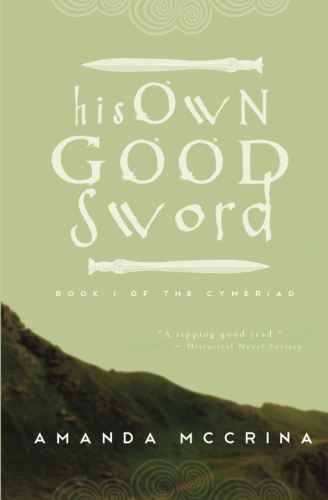I didn’t do quite as much pleasure reading as I would have liked this year, since I still have to at least pretend I’m doing reading for school. I did discover a few new favorites nevertheless (and, despite my grousing, I enjoyed some of my school reading, too). I’m ashamed to admit I’d never read Megan Whalen Turner’s Queen’s Thief series before this year; thankfully—on the recommendation of a friend—that has now been remedied. If I were doing a blanket “best books I read in 2012″ list, MWT’s books would definitely be at the top.
The following list, however, only includes books that may not be quite so well-known, at least to American audiences—scratch that, it includes books that were unknown to me. I’d never heard of any of these before. But they’ve all become new favorites, and if they’re not already on my bookshelves, I hope they soon will be.
Disclaimer: Just to be clear, these are all books I read in 2012, not necessarily that were published in 2012. In fact—none of them were published in 2012. It takes me a while to catch up to the times, apparently.

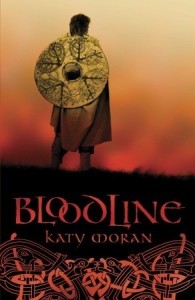 (part native British, part Saxon) and figure out where his loyalties should lie as war threatens to engulf the island. The second book, set a few years later, has a bit of a different flavor at first,
(part native British, part Saxon) and figure out where his loyalties should lie as war threatens to engulf the island. The second book, set a few years later, has a bit of a different flavor at first, 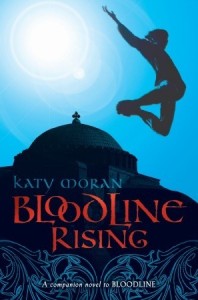 since the scene is shifted to Constantinople; it follows Essa’s son, Cai, whose misadventures in the underworld of Byzantine politics land him on a slave-ship bound for his father’s homeland. The characters are memorable and likable (though realistically flawed), but the real gem here is Moran’s writing, at once reminiscent of Rosemary Sutcliff’s. Her descriptions of Constantinople are dazzling; as I wrote on Goodreads, the city is so vividly drawn that it’s almost a character itself. Both books are highly, highly recommended.
since the scene is shifted to Constantinople; it follows Essa’s son, Cai, whose misadventures in the underworld of Byzantine politics land him on a slave-ship bound for his father’s homeland. The characters are memorable and likable (though realistically flawed), but the real gem here is Moran’s writing, at once reminiscent of Rosemary Sutcliff’s. Her descriptions of Constantinople are dazzling; as I wrote on Goodreads, the city is so vividly drawn that it’s almost a character itself. Both books are highly, highly recommended.
Tomorrow, When the War Began, by John Marsden. I resolve, in 2013, to read more Australian fiction. I enjoyed this one a lot. It follows a group of Australian teens caught up in a Red-Dawn-type scenario, as a foreign army invades their hometown and they must flee into the bush to evade capture. 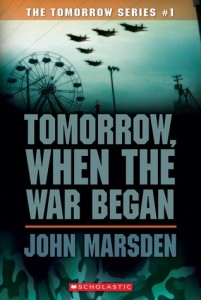 The plot, though fast-paced and exciting, isn’t anything particularly new, but the characters more than make up for it, and the writing is quite strong as well; the first-person narrator, Ellie, has a witty, engaging voice. I look forward to continuing the series.
The plot, though fast-paced and exciting, isn’t anything particularly new, but the characters more than make up for it, and the writing is quite strong as well; the first-person narrator, Ellie, has a witty, engaging voice. I look forward to continuing the series.
Keturah and Lord Death, by Martine Leavitt. I read this little book on a whim, and I’m glad I did. It’s a grown-up fairy tale set in a dark, mythical old England, but at its heart it’s a simple, lovely story about how love trumps death. A cast of colorful, complex characters 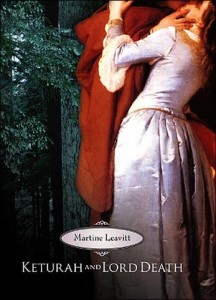 and Keturah’s quiet but wise narrative voice—she reminded me a lot of Lavinia in Ursula Le Guin’s novel, to be honest—make this one memorable. Worth reading and rereading, because there are subtleties to the story that may not become apparent the first time through.
and Keturah’s quiet but wise narrative voice—she reminded me a lot of Lavinia in Ursula Le Guin’s novel, to be honest—make this one memorable. Worth reading and rereading, because there are subtleties to the story that may not become apparent the first time through.
As far as nonfiction goes, I greatly enjoyed reading Vasily Grossman’s A Writer at War—his first-hand account of his time as a correspondent with the Red Army during WWII—and Adrian Goldsworthy’s excellent The Complete Roman Army, by far the best resource I’ve found on the make-up/organization of, and daily life in, the Imperial military.

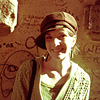 I'm a student, amateur historian, coffee connoisseur, movie buff, hockey fan, cat lady, and all-around nerd. I'm currently pursuing a degree in history and political science at the University of West Georgia. In my spare time, I write historical fiction and fantasy. My debut YA historical fantasy novel His Own Good Sword was released on 7 May 2013.
I'm a student, amateur historian, coffee connoisseur, movie buff, hockey fan, cat lady, and all-around nerd. I'm currently pursuing a degree in history and political science at the University of West Georgia. In my spare time, I write historical fiction and fantasy. My debut YA historical fantasy novel His Own Good Sword was released on 7 May 2013.